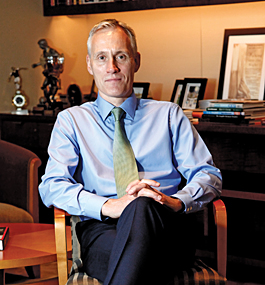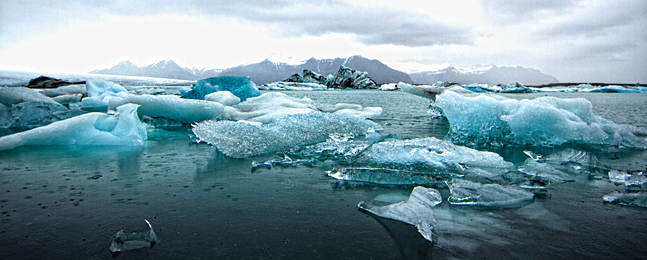A Literary Light in the C-Suite
Business executive Olaf Olafsson ’85 delivers an unusual ROI — stories that plumb love and loss, crime and redemption.

Mike Lovett
by Laura Gardner, P’12
Olaf Olafsson ’85 is a polymath in a siloed world. The author of four acclaimed novels and a short-story collection, the Icelandic émigré is also the executive vice president of international and corporate strategy at Time Warner, overseeing investments and evaluating digital-media opportunities for the Fortune 500 company.
In 1995, a decade after graduating summa cum laude in physics as a Wien Scholar, he introduced the Sony PlayStation to the world. At the time, he was the CEO and president of Sony Interactive Entertainment, a division he founded in 1991. That same year, Olafsson published his first (and best-selling) novel in his native country; three years later it appeared in the U.S. under the title “Absolution.”
Since then, the transplanted New Yorker has written three more novels, “The Journey Home” (2000), “Walking Into the Night” (2003) and “Restoration” (2012), as well as a collection of short stories, “Valentines” (2007). His books are by turns historical (set in war-torn Fascist Italy or Nazi-occupied Denmark) and contemporary, sometimes unfolding in the voice of a female protagonist or two, always propelled by spare yet silken prose.
Critics describe his novels as “serene,” “elegant,” “soulful” and “compelling.” One New York Times reviewer noted his “meticulous attention to place and historical events.” Olafsson’s honors include the O. Henry Award and the Icelandic Literary Prize, and he has been nominated twice for the International IMPAC Dublin Literary Award.
In a twist that may truly merge his literary, business and media interests, “Valentines” is being developed for television by Sundance Productions. The author is writing the script for the series, and Robert Redford is slated to direct.
Here, Olafsson unravels how he came to inhabit both the corner office and the literary salon so comfortably.
When did you discover you were a fiction writer?
I grew up in a literary household — literature was always on the agenda. My father was the first Icelandic writer to win the Nordic Council Literature Prize, and there were often writers, including Iceland’s Nobel laureate, at our house, visiting and chatting.
So, from a very early age, I read literature. I’d go into my dad’s study, and he would say, “Why don’t you try this?” Literature was never pushed on me, but it did rub off on me. I was a teenager when I started to write. Though most of it ended up in the trash can, when I was 15 I published some poetry.
Toward the end of my time at Brandeis, I was writing short stories, and some of them ended up in my first book, which I published in Iceland when I was 23. I took the logical next step, which was to write a novel. I don’t think I knew I wanted to be a novelist until I started doing it.

Ryan Scura
NATIVE SON: Iceland serves as the setting for much of Olafsson’s fiction, lending a tone of austere serenity.
page 2 of 3
How did you learn about Brandeis?
I was a senior in high school in Reykjavik when my headmaster called me into his office and asked whether I would like to study in the States. The headmaster had had some success sending students on the Wien program to Brandeis. [Editor’s note: Iceland’s former prime minister, Geir Haarde ’73, was also a Wien Scholar.] I applied only to Brandeis, and eventually arrived in Waltham on an August evening. It was my first trip to the States.
What was your college experience like?
I like to joke that I was the diversity candidate. The fact that Brandeis at the time was predominantly Jewish was never an issue for me. I never felt like a fish out of water. I was interested in literature, but by the time I went to college, I had read most of the curriculum, so I said to myself, “I’m going to study something else. I’m going to study physics.”
The philosophical nature of physics intrigued me. It tries to answer some fundamental questions about existence, and I was fascinated by concepts like Heisenberg’s uncertainty principle, which is appropriately abstract and somewhat nebulous. I was never interested in engineering, which for me is cut and dried.
One of the great things about studying at Brandeis is that you could get lab time, get attention from professors, and you could work with graduate students, and that’s what happened to me. Steve Berko and Karl Canter, both fantastic scientists in positron physics, were extremely good to me.
You’re an award-winning novelist who’s never taken a class in fiction writing. You’re also a highly successful corporate executive who’s never been to business school. Success in either of these careers would be considered noteworthy; success in both seems astonishing.
I never planned anything from a career perspective; it just sort of happened. I actually resisted giving in to the literary urge. I was a little reluctant — who knows why? I never said, “I have to be a writer.” But if you have the urge to write, it’s going to have its way with you. You’re going to give in in the end. It’s a need that can’t be fulfilled in any other way. And before I knew it, I was doing it.
On the business side of things, it was complete happenstance. It had as much to do with my physics professor as anything else. Steve Berko wanted me to get a PhD in physics, but he introduced me to a former student of his, Mickey Schulhof ’70, who was running Sony in the U.S. — and who offered me a job. That’s how much planning went into that.
From the outside, my life looks schizophrenic and messy enough that nobody could have planned it. Business people find the writing thing a little odd, but it’s nothing compared to how writers react — they find the combination incomprehensible.
page 3 of 3
As a passionate reader and writer, did you have any qualms about bringing the PlayStation into kids’ lives?
I was never interested in the content of video games myself. As a 10-year-old, every now and then I would scrape together a few coins and play the pinball machines in an arcade in Reykjavik. But I’ve never played video games. The PlayStation was a business endeavor that became part of the entertainment culture.
There are all kinds of things that take away from reading. In the old days, it was radio and then television, and now it’s social media and the Internet. The hope was, back then, that the story-telling aspect of video games would become more interesting, but I don’t think they have. But I don’t think video games either encourage or detract from an interest in reading. The interest needs to be there in the first place.
What’s your writing schedule like?
I’m a man of routine. What works for me is to write early in the morning, before I go to the office. If I get two to three hours in, I’m happy. Then I put on my suit and go to the office and won’t think about writing until the next morning, when I’m back at my desk. On weekends, I write four hours a day. Hemingway always left something for the following morning, so he would have an easier time getting going. I’ve always found that to be a good way of doing things.
How do your books develop?
I wait for characters to take shape and become fully formed. I don’t want to begin prematurely. So I don’t start writing until I’m getting extremely antsy. As writers, we’re impersonators, and we’re stuck with our characters for years as the story develops, so you better make sure you want to spend time with them before you commit.
Do you write in English or Icelandic?
Sometimes in English, sometimes in Icelandic. I do the translation myself sometimes, and sometimes in collaboration with Victoria Cribb, an Icelandic translator who’s terrific and has worked with me for years.
How much of your success do you attribute to Nordic calm?
We’re fishermen. You know you have to go out every morning, and you’re not going to despair if you come up short one day. With writing, there’s a bit of “There’s a task at hand; just do it.” Life continues, even in failure. But the earlier you start writing — and reading — the earlier you’ll find out whether you’re good at it or not.
